Flooded Out by Racism
Air Date: Week of February 23, 2024
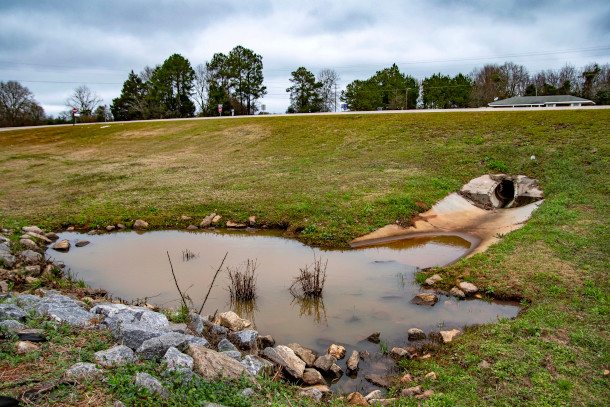
The highway drainage pipes let water out directly towards homes in Shiloh. Typically, drainage runs parallel to roadways to prevent such issues. (Photo: Lee Hedgepeth, Inside Climate News)
Dr. Robert Bullard continues to earn his moniker as the “father of environmental justice” by calling for justice for the community of Shiloh, Alabama. The area has suffered repeated flooding ever since a highway was widened and elevated in 2018, causing destruction to homes that Black landowners have proudly kept since the Reconstruction era. Dr. Bullard sat down with Host Steve Curwood to describe the trouble in Shiloh and how it’s affecting residents. They also take a wider look at environmental racism in America today and increasing vulnerabilities from climate change in the years to come.
Transcript
CURWOOD: From PRX and the Jennifer and Ted Stanley Studios at the University of Massachusetts Boston, this is Living on Earth.
I’m Steve Curwood. And today, we're celebrating Black History Month, starting with a man who has already made history and still is making it. Back in 1979, Robert Bullard was a freshly minted Ph.D. sociologist at Texas Southern University, researching segregated residential housing. One day his then-wife Linda McKeever Bullard came home to announce she had sued the state of Texas, Harris County, and the City of Houston. Her case cited civil rights laws to fight the siting of a municipal waste dump in the middle of a predominately black middle-class neighborhood. To back up her case, Professor Bullard used his skills with mapping and zip codes to document all five city dumps, and six of eight trash incinerators were located in Black communities, even though only 25 percent of Houston's population was Black. This was the first major case to apply civil rights laws in the fight against environmental racism, and it launched Dr. Bullard's career through the following decades, writing about and actively bringing to light eco-discrimination. Today, as the director of the Robert D. Bullard Center for Climate and Environmental Justice and a distinguished professor at Texas Southern University, Dr. Bullard is widely known as the father of environmental justice. But he's not resting on his laurels that include honorary degrees and many awards. Right now he is busy working on yet another case, and this one brought him to his roots in Coffee County, Alabama. Shiloh is just east of Elba, in Alabama, in an area that has been proudly kept by Black landowners since the Reconstruction era. But the widening and elevation of nearby Highway 84 has caused repeatedly destructive flooding for the past six years, with no signs of stopping. And now this disaster has become a personal mission.
I recently sat down with Dr. Bullard, and I asked him how he learned about the trouble in Shiloh.
BULLARD: I grew up in Elba, Alabama in the 50s. And I went to a segregated elementary, middle, and high school. And I grew up in a time when our streets weren't paved. We didn't have sidewalks, we didn't have indoor plumbing and sewer lines, etc. I left Alabama in 1968. And I hadn't been back to Alabama for any extended time. And so I got a call, and it was June of last year, from some of the people I had gone to school with, saying that, Bullard you need to come back to Elba, because there's a highway that's in Shiloh community, which is outside of the city, in Coffee County, in the rural area. This highway is now causing flooding in the community. The Alabama Department of Transportation elevated the highway, you know, 10, 15 feet high and placed the community in a bowl. And the drainage system, storm water is now pushing water into the community. And I said what? I knew Shiloh was flat, it was farmland. There was no elevated highways or anything like that. And so I told them, I said, as soon as I get through what I'm doing, I'll come. And so I went in July. And what did I see? It happened to be raining in July. And I went to the community in Shiloh. That highway was just standing tall over the community. And we were there for like 45 minutes standing and I was up to my ankles in water. I said this is, this is terrible. This had been going on since 2018.
CURWOOD: Talk to me about Shiloh, in Coffee County, Alabama. Please paint a picture for us, if you will. What's the community like there?
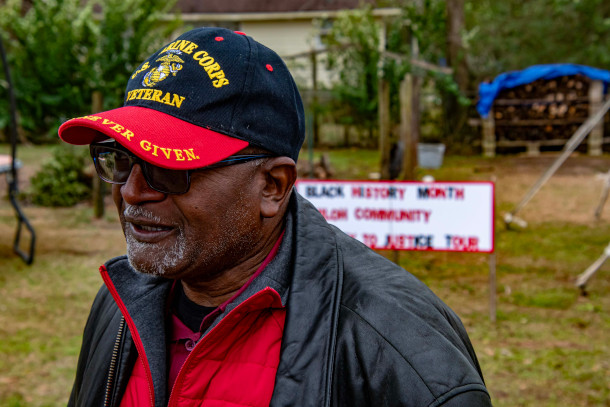
Professor Robert Bullard grew up in Elba, Alabama, which is in the same county as the Shiloh community. (Photo: Lee Hedgepeth, Inside Climate News)
BULLARD: Well, you know, Coffee County is part of the family of Black landowners. Like my family. My family has owned land in Elba, Alabama since 1875. And that land is still in our family. Well, in Shiloh, you also have landowners that have owned land since Reconstruction. And these landowners survived slavery, Jim Crow segregation, and this highway now, it's created a nightmare. And so you're talking about land that is now being flooded. This is not a flood zone, residents out there don't qualify for flood insurance. And so you're talking about an area that is rural with septic systems. And when you have a septic system that is overburdened with flood waters, you have major problems of sewer line backups in homes, that people's homes are sinking into the ground. And their foundations are cracking, their roofs, the whole infrastructure of these homes are cracking. You're talking about veterans, in some cases, who went back home, retired after spending 25, 30 years in the military. They went back to live out their remaining days in peace. It has created a nightmare. I wrote a book on Highway Robbery: Transportation Racism in 2023. If I had to write a book today, the cover of that book would be Shiloh. This is highway robbery.
CURWOOD: Wait, I'm scratching my head. Ordinarily, highway drainage pipes are parallel to the road. But in Shiloh, what, they're pointing directly at this part of the community?
BULLARD: You know, I'm no engineer. But this is not rocket science. If you look at the way that this highway was built, you take a level neighborhood that's flat, and then you elevate a highway, and then the law of gravity will send that water down into the community. And if you look at the damage that has been caused over the last six years that this has happened, you can see the drainage systems are pointed like cannons into the community. It's almost as if the state is saying, “We want you out of here. And if you don't leave, we're gonna drown you. We're gonna drive you out.” This is one of the worst cases of environmental racism that I have seen in the 40 years that I've worked on this. This is not an industry, this is not some corporate. This is government, where people pay taxes. And this is tax dollars that's been used to build an infrastructure that is creating a nightmare for the community. This is an area where you have a lot of retired people who are living on fixed incomes, who don't have $5,000, $10,000 to repair or to replace a septic system. This is where you have homeowners. They're now being threatened with their homeowners' insurance to be canceled. And the stress. Some of the folks are saying that it's almost like they've been in a war zone. PTSD, mental stress. The residents don't have the money to fix up their homes, to have them cleaned up when their bathrooms backup and the stuff is coming out. I just had a call today saying that the septic systems now are overflowing and now raw sewage is running into the yards. This is not safe. This is not sanitary. This is not healthy.
CURWOOD: So in a situation like this, people will go to court. What's happened down in Shiloh?
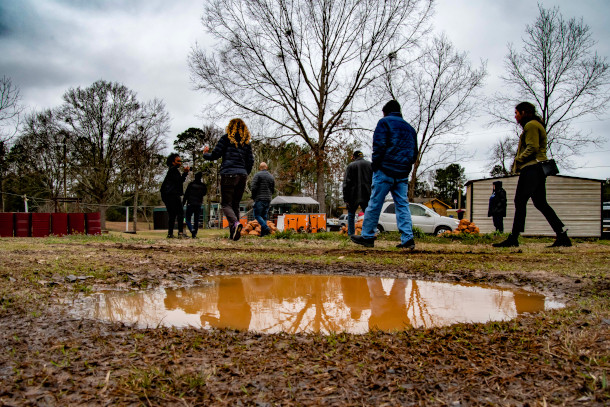
Detention ponds and makeshift ditches can remain full of several feet of water even days after a rainstorm. The deep ditches present safety risks, and the standing water increases chances of mosquito borne disease in the community. (Photo: Lee Hedgepeth, Inside Climate News)
BULLARD: Well, the residents filed a Title VI discrimination complaint with the Federal Highway Administration, and that investigation is still ongoing and it's been over a year, and they're still investigating and the community is patient. But while the Federal Highway Administration, the government is doing that investigation, it's getting worse and worse and worse. And not only the flooding, the community discovered that there's a pipeline, a gas pipeline that runs parallel to the highway. They didn't know anything about this until recent. And New Year's Eve, there was a gas leak from that pipeline that created a lot of concerns about the residents. There are no warning signs in terms of pipelines. And as it turns out, the gas company, Southeast Gas came out and replaced two pressure regulators. And both the flooding and the pipeline are controlled and are under the jurisdiction of the United States Department of Transportation. So Secretary Pete Buttigieg is basically overseeing, and the community has asked Secretary Pete to come to Shiloh and visit and see exactly that this is not a good use of transportation dollars. Even though that road was built under the Trump administration, the community is saying that the Biden administration has the responsibility and the obligation to fix this now because of the billion dollars under the bipartisan infrastructure law. And under the billions of dollars that's under the Inflation Reduction Act. We want to see action now. This community has waited too long for justice, and justice delayed is justice denied. And this community is hurting every day that this problem goes unfixed.
CURWOOD: You suggest that perhaps this was intentional, the building up of this highway and having the drainage come into this community with the idea of perhaps pushing that community out. And this is the year 2024. This is not something from the era of Jim Crow. This is happening in this Black community. Why?
BULLARD: This is happening today because somehow this community is considered less than. It has not been given the same opportunities and the same kind of care that's taken with white communities that run along that highway. There were white families that were bought out, there were white businesses that were bought out. And then they were not given the same level of treatment. So if we talk about Jim Crow, or differential treatment, we're talking about the whole idea of being treated differently if you live on one side of the road, and that side of the road that you live on happens to be Black. Now that is black and white. That is something not made up. It's real. And if the Secretary of Department of Transportation come and visit, we would say to him, in person, “This is not what federal dollars are supposed to be used for.” The federal dollars are supposed to be used to bring about opportunity, to bring about mobility. It is not to destroy. And it's not just destroying the property and the houses for the people that are living today. You're talking about the death of inheritance. Most of the families that live out there, as I said before, can trace their heritage back over a hundred years in terms of when that land was given. And so the loss of wealth that's taken by that flood, and by so close to pipeline, we say that is highway robbery. It is theft of wealth. And we say that that is not how tax dollars should be spent.
[MUSIC: The Staple Singers, “Respect Yourself” on The Very Best Of The Staples Singers, Concord Music Group]
CURWOOD: We’ll be back after the break with more from our conversation with the father of environmental justice, Dr. Robert Bullard. Stay tuned to Living on Earth.
ANNOUNCER: Support for Living on Earth comes from Sailors for the Sea and Oceana. Helping boaters race clean, sail green and protect the seas they love. More information at sailorsforthesea.org.
[CUTAWAY MUSIC: Louis Armstrong and His All Stars, "West End Blues" (Live 1955) on Ambassador Satch, Sony Music Entertainment]
CURWOOD: It’s Living on Earth, I’m Steve Curwood.
And we’re back with our Black History Month special we began with Dr. Robert Bullard, the father of environmental justice. The community of Shiloh, Alabama has been facing disastrous flooding for six years, thanks to a decision to elevate a nearby highway. That turned the flat neighborhood into a sort of geographic bowl, and homeowners have been unable to keep up with the continual damage to their homes and daily lives. Professor Bullard explains that this is only going to worsen with climate disruption.
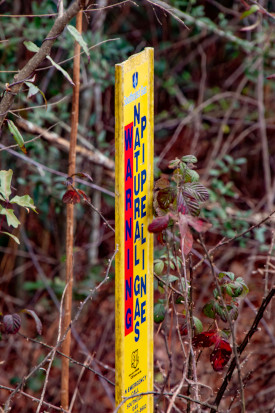
Shiloh residents are also concerned about a nearby gas regulator, which leaked on New Year’s Day. (Photo: Lee Hedgepeth, Inside Climate News)
BULLARD: You know, climate change is a vulnerability accelerator. Climate change, like flooding, will increase in coming years. And so the fact that we now have a manmade flooding situation, in terms of this highway, it's only going to get worse. As I said, I've been to Shiloh in the last seven months, it's flooded three times that I've been there. And it's not just hurricanes that we're talking about, or tropical storms, we're talking about heavy rains, that the area's flooding. We're likely to see more and more flooding. This is not a floodplain, the area does not qualify for flood insurance. And so you're talking about a widening economic gap and a widening wealth gap in coming years because of the vulnerability and the geographic location of where they are.
CURWOOD: What's the solution? Some suggest a buyout of the people there, some suggest doing the engineering to move the risks of the pipeline, and the grading of the highway away from this community. What do you think should be done?
BULLARD: Well, I think the community should drive the solution, and the perpetrator of the problem should pay. It's like, we have a principle in the environmental justice movement. It's called the polluter pays principle. In this case, the person or the organization or the institution or the agencies that caused the problem should fix the problem, and compensate the communities for their loss and damage. Everything that was damaged, the community should be made whole. And for some residents who want to be bought out, I think that's their preference. But for those who want to stay, and want to maintain their lineage, they want to maintain their inheritance and want to keep that land being passed down from one generation to the next, unbroken, they should have that right. The highway department did not have the right to destroy this community, it does not have the right to continue to create harm for this community. So I think there has to be a solution with the city, the county, the state and the federal government. But the ultimate solution is to make this community and the homeowners whole. Property owners whole. And it's not just fix the highway and forget the people. The damage that has been caused in terms of people's homes, people's property that's damaged, the mental stress. I've talked to the residents and they are stressed out. They have lived six years of hell, their American dream has been turned into a nightmare. And whatever compensation, whatever mental health counseling or whatever that's needed, I think we bring in experts to talk about solutions to this problem in terms of how do we make this community whole. And to make sure that it never happens again.
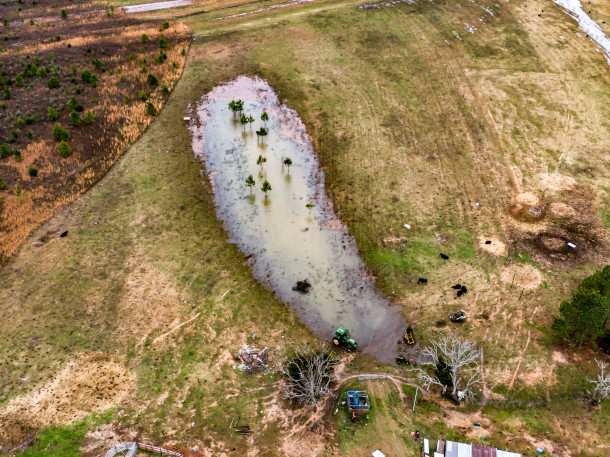
The water carried into Shiloh is often polluted with litter and debris, which is then deposited on the residents’ land. (Photo: Lee Hedgepeth, Inside Climate News)
CURWOOD: Now, you're Robert Bullard, you're not just an ordinary advocate here. Many call you the father of environmental justice, you've written I believe, some 18 or more books about environmental racism. And by the way, you sit on something known as the White House Advisory Council on Environmental Justice. So you have direct access to the White House. What kind of response were you able to get at the national level to get this situation taken care of? I mean, another way of asking this question is, if Bob Bullard with his resume and his connections can't get this fixed, where could anything ever get fixed when it comes to environmental racism?
BULLARD: Well, you know, when 2024 came in, I said, I'm gonna make a New Year's resolution. It's something I don't usually do. But I said, I'm gonna make an exception. I said, 2024 will be the year that Shiloh gets justice. And I said if I can't get justice for Shiloh, I need to knock my name off of that, quote, "father of environmental justice." And I need to somehow resign from the White House Environmental Justice Advisory Council. Because if this is not the example, this poster child for environmental racism, if we can't get justice, there needs to be some changes. And I think the idea, we're getting traction, we're getting into those rooms, there's consideration right now as we speak. And, you know, I'm not just a professor, but I'm also a Vietnam-era Marine Corps vet, oorah. We are relentless. We are like the Terminator. And I told the community when I came there in July of 2023, I will be back, laser-focused. And so we will get justice in 2024. This is Black History Month, and the fact that we need to highlight our history. We need to highlight our victories. But we also need to make history. We want to make history in 2024 by getting justice for Shiloh. Justice for these Black landowners that inherited land from their parents and grandparents that came out of Reconstruction. That is what we're talking about getting justice for.
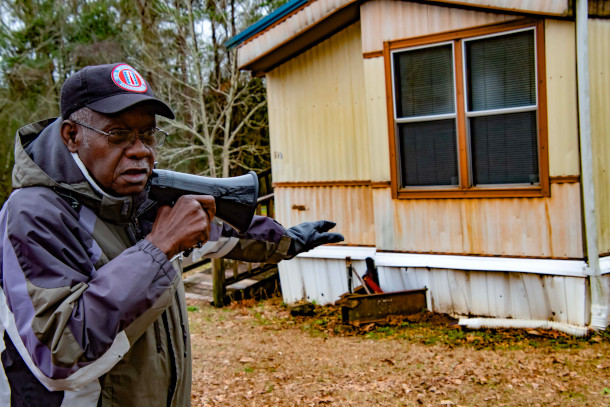
Shiloh resident Willie Horstead Jr.'s home is sinking into the ground due to the extreme flooding. The sinking house has even caused his gas meter to rip through the home’s underpinning. (Photo: Lee Hedgepeth, Inside Climate News)
CURWOOD: Professor Bullard, why do you think environmental racism is still so pervasive in this country?
BULLARD: Well, you know, America is segregated, and so is pollution. And so are the vulnerabilities to climate. So are the vulnerabilities to where highways are built or infrastructure is built, I call it infrastructure apartheid. It's hard to unpack those centuries of history, and to get that out of our policymaking. And it's true in voting, civil rights, environmental protection, as well as issues around education. We have to dismantle those systems that create these inequalities. And we have to fight harder today because there are forces that are trying to take us back to literally the cotton fields, or trying to take away our right to vote or take away our right to education. And so we have to fight harder. And we have to understand that young people are more likely not to see these barriers that are artificially thrown in front of us. They want to move forward and move fast and furious. And I think climate change is one of those areas. As I said, I'm a Boomer, proud of it. Still fighting, still standing. But Millennials, Gen Xers and Gen Zers or Zoomers, they outnumber us. That new majority has to be given that platform to make those changes and dismantle this artificial system that create these separate and unequal opportunities and realities. That's the struggle. And that's the challenge of the future.
CURWOOD: Now, you've been working on environmental justice for virtually all of your career. What gives you hope, from all this work?
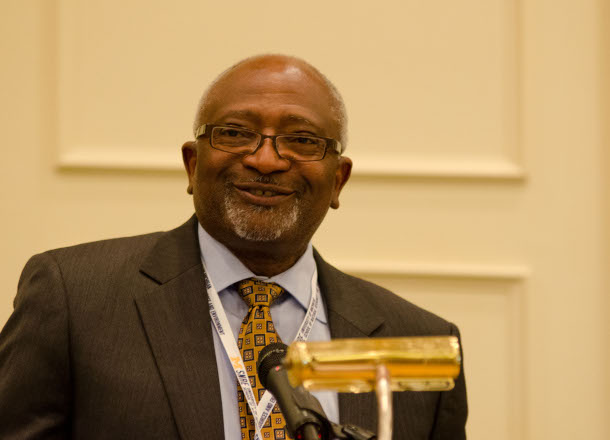
Professor Robert Bullard, nicknamed as the “father of environmental justice” has made getting justice for the Shiloh community a personal goal for 2024. (Photo: Dave Brenner, University of Michigan School for Environment and Sustainability, Flickr, CC BY 2.0)
BULLARD: Well, what gives me hope is, we have come a long way. What keeps me going is the fact that we have generations of environmental justice scholars, activists, lawyers. I have students who have students who have students that are doing this work now. And when I started, there was no money, when President Clinton signed the executive order for environmental justice, February 11, 1994. And 30 years later, when President Biden signed the executive order on environmental justice, the day before Earth Day in 2023. Now we have an Inflation Reduction Act that has $60 billion, billion with a B, for environmental justice and another $60 billion for a clean energy transition. We have made a lot of progress. But in 2024, we still have Shiloh that's flooding. So we still have a hell of a lot of work. And a hell of a lot of convincing that these issues of structural and institutional racism that drive a lot of the environmental degradation, and even drive the vulnerability for climate change. In the coming years, flooding is going to be a major problem for the country. 25% increase in flood risk. But for communities of color and Black communities it's not 25%, it's 40%. So we need to concentrate on solving these problems, and making sure that we build vulnerability indices and deal with these communities that are at greater risk for climate and make sure that when we come up with solutions, they just don't somehow plan for the more affluent, but we have to plan for the most vulnerable. If we plan for standards, environmental standards that would protect children, the most vulnerable in our society, we protect everybody. When we place the most vulnerable at risk, we place everybody at risk. Going forward we have to make sure we put justice and environment justice and climate justice in housing, transportation, energy, and health. It's one movement now and that movement is about justice.
CURWOOD: Robert Bullard is a Distinguished Professor of Urban Planning and Environmental Policy at Texas Southern. Thank you so much for taking the time.
BULLARD: My pleasure. Thank you.
Links
Inside Climate News | “How Racism Flooded Alabama’s Historically Black Shiloh Community.”
Living on Earth wants to hear from you!
Living on Earth
62 Calef Highway, Suite 212
Lee, NH 03861
Telephone: 617-287-4121
E-mail: comments@loe.org
Newsletter [Click here]
Donate to Living on Earth!
Living on Earth is an independent media program and relies entirely on contributions from listeners and institutions supporting public service. Please donate now to preserve an independent environmental voice.
NewsletterLiving on Earth offers a weekly delivery of the show's rundown to your mailbox. Sign up for our newsletter today!
 Sailors For The Sea: Be the change you want to sea.
Sailors For The Sea: Be the change you want to sea.
 The Grantham Foundation for the Protection of the Environment: Committed to protecting and improving the health of the global environment.
The Grantham Foundation for the Protection of the Environment: Committed to protecting and improving the health of the global environment.
 Contribute to Living on Earth and receive, as our gift to you, an archival print of one of Mark Seth Lender's extraordinary wildlife photographs. Follow the link to see Mark's current collection of photographs.
Contribute to Living on Earth and receive, as our gift to you, an archival print of one of Mark Seth Lender's extraordinary wildlife photographs. Follow the link to see Mark's current collection of photographs.
 Buy a signed copy of Mark Seth Lender's book Smeagull the Seagull & support Living on Earth
Buy a signed copy of Mark Seth Lender's book Smeagull the Seagull & support Living on Earth

